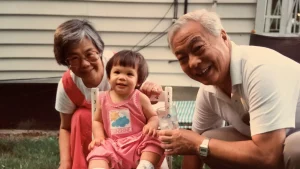There was a compelling story this week on NPR dealing with individuals from families with mixed ethnic backgrounds. In the story, Emily Kwong discusses her decision to learn Mandarin Chinese at the age of 30. Her Dad had grown up speaking Chinese as his first language, but when he started school, he started learning English, and soon switched over completely. When she was little, Emily had learned some Chinese from her grandmother but had not retained any. As an adult, she started to feel increasingly that she needed to try to reconnect with the Chinese side of her identity and decided that necessitated learning the language of her father.
The feeling that Emily has of “feeling that I’m not Chinese enough” has sometimes been labeled racial imposter syndrome, the sense that individuals may have that their lives are in a sense inauthentic because they don’t conform to key aspects of the ethnic heritage with which they identify. That might be related to a lack of knowledge about traditional customs or aspects of the way of life, or be connected to the individual’s appearance. But quite likely there will be a language component. For Emily, learning Chinese has proven to be a challenge, as it is for many native English speakers, particularly if one starts later in life. However, the difficulties she has had with the language pale when compared to the shame she feels in not being able to connect at all with her Chinese-speaking relatives:
I’ve decided that any shame I might feel about imperfect pronunciation, fumbles with grammar is nothing compared to the shame I felt about not knowing the language at all; the shame I feel as my older relatives rattle off dim sum dishes and I stare down the menu pictures, feeling like a fraud within my own identity, missing something I never had in the first place.
This sense of feeling like a fraud within one’s own identity is likely felt by many individuals from immigrant families or those with connections to multiple cultures. NPR a few years ago did a series on such cases, which are increasing as American identities become more mixed. The accounts of experiences are revealing. A woman whose mother is Panamanian and father a white American recounted:
When I was young (20s) and living in the city, I would get asked multiple times a day where I was from, where my people were from, because Allentown, Pennsylvania, clearly wasn’t the answer they were looking for … It always felt like the undercurrent of that question was, “You aren’t white, but you aren’t black. What are you?” But truthfully, I don’t feel like I fit with Latinas either. My Spanish is atrocious and I grew up in rural PA. Even my cousin said a few weeks ago, “Well, you aren’t really Spanish, because your dad is white.” Which gutted me, truly. I identify as Latina.
Another individual featured was a light-skinned biracial woman:
White people like to believe I’m Caucasian like them; I think it makes their life less complicated. But I don’t identify as 100% white, so there always comes a time in the conversation or relationship where I need to ‘out’ myself and tell them that I’m biracial. It’s a vulnerable experience, but it becomes even harder when I’m with black Americans. It may sound strange — and there are so many layers to this that are hard to unpack — but I think what it comes down to is: they have more of a claim to ‘blackness’ than I ever will and therefore have the power to tell me I don’t belong, I’m not enough, that I should stay on the white side of the identity line.
Emily’s effort to retrieve a heritage through language learning may not apply to everyone, but for many it may be an important tool for feeling less like a “fraud”. The experiences in her family illustrate a frequent pattern in immigrant families, namely that the first generation may give up their first language, as Emily’s Dad did, in order to assimilate into mainstream US society. That was widely the case throughout the 20th century in the US. Second or third generation children, like Emily, discover often that not speaking the language of their immigrant parent or parents leaves a void in their sense of who they are.
